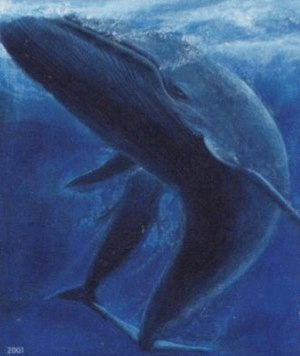Template:Species-2012-04-1
Species of the month[edit]
Blue Whale[edit]
Some facts on this mammal:
Adult size: 20 to 33 meters.
Adult weight: Up to 190,000 kg.
Range: Polar to tropical seas.
Diet: Feeds almost exclusively on krill.
Life-span: 80 years and beyond.
Surviving number: Estimated at 10,000.
Conservation status: Endangered (IUCN 3.1).
First described: By the Swedish naturalist Linnaeus in 1758, who originally named it Balaena musculus.
Balaenoptera musculus won't fit on your plate. This whale is the largest animal known to have ever existed on Earth;
it has a tongue that weighs two tons and a heart as large as a small car. Instead of teeth, it has 300 to 400 fringed baleen plates that hang from the upper jaw and strain food out of the water. This marine mammal gulps a mouthful of water with krill, closes its mouth, pushes out the water with its tongue and then swallows the catch of krill. Calves nurse for seven to eight months, consuming 400 litres of milk daily. They can gain weight at 4 kg per hour and grow 4 cm each day. Blue whales were hunted almost to extinction. For example, in the 1930–31 season, 29,500 were caught in the Antarctic ocean alone. Finally, in 1966, hunting was banned, but the numbers still remain at under 1% of their original levels.
(Archived from Template:Species of the week)
